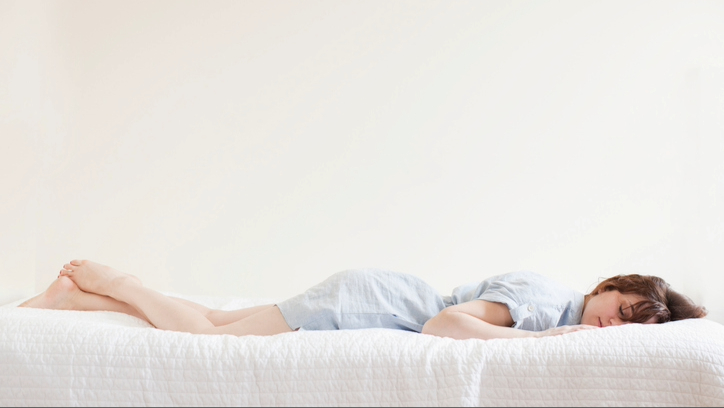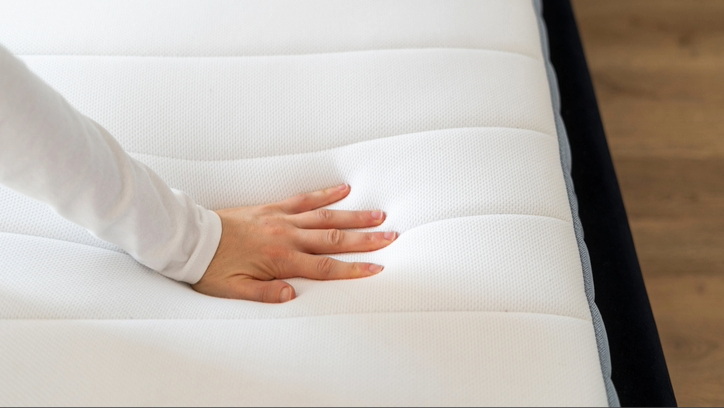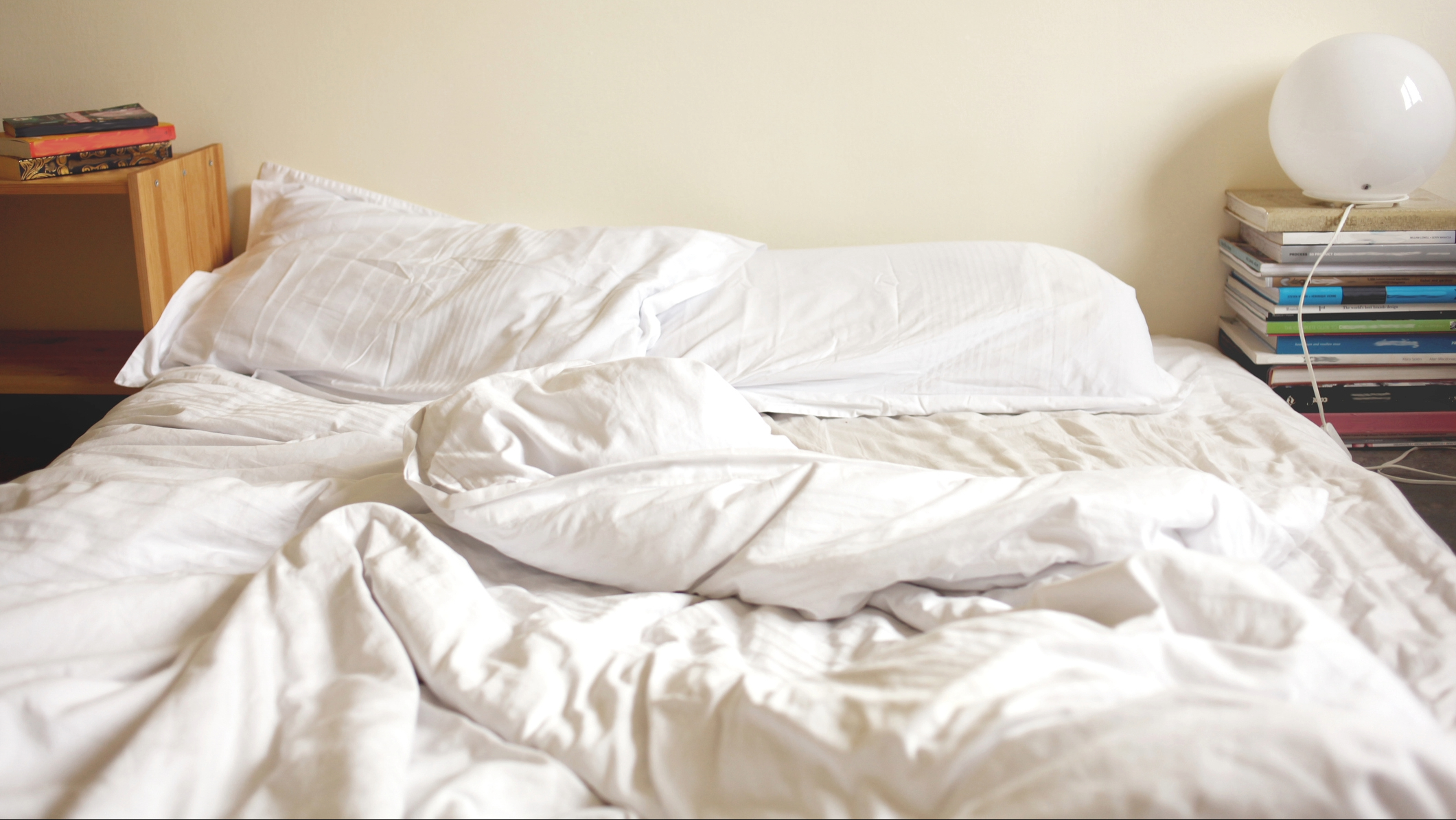What are mattress body impressions and are they a problem?
Most body impressions are normal, but some impact the support and comfort of your mattress

Not to be confused with mattress sagging, body impressions can inflict any mattress, new or old, luxury or cheap. They are a normal sign of your mattress contouring to your body, giving you the support you need for a comfortable, restful sleep.
Even our top picks in this year’s best mattress guide for all sleepers and budgets will show body impressions. So, before you panic about your new mattress getting bumpy or seeming to dip, it's important to understand what causes body impressions and when they might become a problem.
Here, we’ll dive into what body impressions are, when they're a problem and how you can prevent them so your mattress can stay supportive for longer.
What are body impressions?
Body impressions, also known as mattress settlement, are indentations that form in a mattress over time. They occur as a result of the mattress contouring to the weight and shape of your body.
They tend to be found in areas of the mattress where you put the most pressure, which is the shoulders, hips and lower back for most sleeping positions. Body impressions are usually small and temporary, but they can become permanent over time and change the feel of the mattress, making it feel uneven.
What causes body impressions?
- Your mattress is getting old
- You haven't looked after your mattress well
- You are too heavy for your mattress
Sleeping position, weight distribution, mattress material and density, sleeping area and mattress size are all things that cause and influence natural body impressions. Prolonged periods of sleep in the same position and area of the mattress leads to body impressions. The continuous pressure exerted in these specific areas can cause the foam or latex to compress more, leading to noticeable imprints.
However, there are other, more concerning things that cause body impressions too, including mattress age, how well you have cared for it and whether it is able to support your body weight.

Old mattresses will become bumpy and uneven at the end of their lifespan as coils protrude through support layers, causing discomfort. These bumps can be mistaken for body impressions, when they are really a sign you need to replace your mattress.
You might not have ever thought of your mattress as high maintenance, but mattresses do in fact require some TLC. First you must ensure your mattress is supported by a sturdy bed frame for it to perform at its best.
Rotating your mattress and changing your sleeping position will also ensure your mattress isn’t being worn down, causing deep body impressions. Finally you can protect your mattress and extend its lifespan by using one of the top picks in our best mattress topper guide.
Most mattresses can accommodate a weight of up to 250lb per person. If your weight exceeds that, you may sink through the supportive layers of the mattress, causing body impressions. This can be uncomfortable as well as detrimental to the mattress and support layers. Instead, opt for a mattress specially designed for heavy bodies.
Are body impressions a problem?
Unlike premature mattress sagging, body impressions are normal. Mattress sagging is when a crater is created in the mattress, significantly reducing the support it offers early in its lifespan. Whereas it is only natural for a mattress to soften as you lie on it every night, forming body impressions. These are not so problematic, and can in fact be beneficial.
Mild body impressions have been clinically proven to help support spinal alignment and alleviate tension in pressure points. High-quality mattresses intentionally soften to accommodate your body. In this case it is important to remember that the mattress is not breaking down beneath you, but molding to your body to offer the best support.

That said, deeper body impressions (beyond 1.5 inches) can make your mattress feel bumpy and, therefore, less comfortable in some cases. These are the problematic body impressions that suggest your mattress is aging or not performing as it should. Deep indentations will not provide adequate support for the spine, which can lead to poor spinal alignment and back pain.
If body impressions are causing you restless nights, it might be worth investing in a new mattress, especially if yours is older than 10 years (lumps and bumps are among the things that can happen to your mattress after 10 years). Alternatively, if you’re concerned about body impressions in a new mattress, ensure your mattress is compatible with your bed frame, make sure you rotate your mattress and check your manufacturer’s warranty.
What mattresses are prone to body impressions?
No matter the mattress you have, be it one of the best luxury mattresses or one of the best cheap mattresses, body impressions are likely to occur. However, some mattresses are more prone to indentations than others.
The mattress’s firmness level can impact how likely it is that body impressions will occur. As a general rule, softer mattresses are more susceptible to impressions than firmer ones as they are more responsive to weight placed on them.

The material a mattress is made from will also influence how prone it is to body impressions. Latex mattresses, and even the best memory foam mattresses, particularly show short-term body impressions because they are designed to contour to the sleeper’s body shape. As these materials are responsive, these body impressions shouldn’t last long.
Additionally, as you can probably predict, cheaper mattresses are more prone to body impressions. This is because they use cheaper materials that offer less support and are more susceptible to wear and tear than more expensive, durable materials. Cheaper mattresses also tend to have less comfort and supportive layers, which makes it easier to notice body impressions.
How to prevent body impressions
Rotate your mattress
Rotating your mattress top to bottom can prevent body impressions. Switching up the position of your top and tail on the mattress will redistribute weight.
This will prevent pressure building up in certain areas of your sleep surface, avoiding lumps and bumps from forming. Solo sleepers could also change which side of the bed they sleep on from time to time and, bare I say it, couples could switch sides to prevent indentation.

Choose responsive materials
It is important that your mattress is made of responsive materials for the best comfort and support. Natural latex and memory foam are among the most responsive mattress materials.
So, while a mattress made with these materials may show impressions where it has contoured to your body overnight, these indents shouldn’t be long-lasting and the mattress will return to its original shape.
Opt for a mattress topper
Mattress toppers can prevent body impressions by providing an extra layer of cushioning and reducing the strain on your mattress.
Investing in a plush mattress topper is a cheaper way of getting the benefits of a luxury mattress without having to fork out on a new model.
Sign up to get the BEST of Tom's Guide direct to your inbox.
Get instant access to breaking news, the hottest reviews, great deals and helpful tips.

Eve is a PPA-accredited journalist with an MA in Magazine Journalism from Cardiff University. She is a Sleep Staff Writer at Tom’s Guide and has four years’ experience writing health features and news. She is particularly interested in the relationship between good sleep and overall health. At Tom’s Guide Eve is responsible for coverage and reviews of sleep tech and is our smart and cooling mattress specialist, focussing on brands such as Eight Sleep and Sleep Number. She also covers general mattress reviews, seeks out the best deals to produce tried-and-tested buyer's guides for sleep accessories and enjoys writing in-depth features about sleep health. She has been involved in rigorous testing procedures for mattress reviews in our Sleep Studio and has interviewed experts including sleep doctors and psychologists. When not covering sleep at Tom's Guide, Eve enjoys writing about health and fitness, food and culture.
